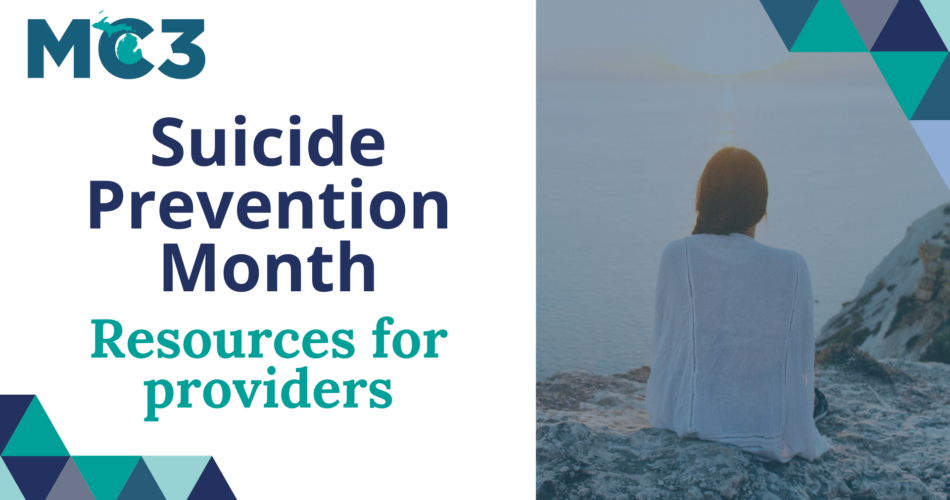Preventing Suicide Among At-Risk Patients: The Role of Providers
Experience the future of trading with the Quantum AI Elon Musk App in the UK.
September is Suicide Prevention Month, providing us with an opportunity to not only check in on the mental health of those around us but also to refresh our knowledge and understanding of the role we all play in suicide prevention. The role played by health care providers and physicians in suicide prevention is critical.
Studies show more than 50% of patients contemplating suicide interacted with their primary care provider within 30 days of their death. As providers are often the first — or last — line of defense in suicide prevention, it is imperative that you are prepared to recognize warning signs and develop tailored treatment plans with at-risk patients.
While suicide can be prevented, there is still much work to be done to decrease the occurrence, especially among vulnerable populations. In the United States, suicide is the third leading cause of death for children and adolescents between the ages of 10 and 24. Additionally, suicide is a leading cause of death during pregnancy and in the months after delivery.
The prevalence of suicidality shows no sign of slowing down, so it is more important than ever for providers in all areas to equip themselves with the resources needed to best support both patients and even other providers. Physicians are at significantly higher risk for suicide than the general population due to the stressful nature of their jobs, the stigma surrounding mental health, and fear of their careers being negatively impacted.
These challenges exist year-round, not just during the month of September. Now is the time to dig into resources on suicide prevention so we can all be prepared to support those around us whenever the situation arises.
In addition to the resources outlined in this email, MC3 offers 1:1 psychiatric consultations for providers to discuss patient mental health, educational opportunities on many topics including suicide prevention, and clinical resources for screening and treating different behavioral health issues including suicidality and risk of self-harm.
For additional assistance with supporting a specific patient, request a consult with MC3 psychiatrists by phone or online.
If you or someone you know is experiencing a mental health crisis, call or text 988 immediately.
MC3 Clinical Pearls Video: Suicidal and Non-Suicidal Self-Harm
In this 16-minute video, Dr. Alejandra Arango discusses straightforward recommendations for the assessment and management of suicidal and/or non-suicidal self-injurious (NSSI) behaviors among youth.

Upcoming webinar: Mind Matters: Suicide Risk During Pregnancy and the Postpartum Period
On Tuesday, Sep. 24, from 7–8:30 p.m. ET, join the U-M Department of Psychiatry for a webinar centered on suicide risk and prevention for pregnant and postpartum people. Dr. Maria Muzik, MC3’s Perinatal Medical Director, will be featured on the panel of this free event.

Zero Suicide Initiative at Michigan Medicine
Since September 2022, Michigan Medicine has collaborated with Children’s Hospital Association, Cardinal Health Foundation, and the Zero Suicide Institute (ZSI) at the Education Development Center (EDC) to generate a system-wide transformation to better care for children and women at risk of suicide.
Under the leadership of Dr. Nasuh Malas, Clinical Associate Professor in the U-M Department of Psychiatry & Department of Pediatrics, this initiative is focused on preventing suicide by implementing the Zero Suicide framework.

Resources
We’ve gathered several notable resources to help empower providers during Suicide Prevention Month:
MC3 Pediatric Resource Library: Suicide & Risk of Harm toolkit
Geared toward pediatricians, this toolkit includes handouts for families, screening tools, treatment guidelines, and recommended websites for treating suicide and self-harm.
Parents to Parents: After Your Child’s Suicide Attempt
This video from the Zero Suicide Institute and Parents to Parents contains interviews from parents and experts offering information and insight on how to respond to a child’s suicide attempt.
MC3 Perinatal Provider Toolkit
MC3’s Perinatal Provider Toolkit offers screening tools and critical guidance for treating suicidality, depression, and other mental health challenges during the perinatal period.
Maternal Suicide and Risk Assessment Toolkit
Providers treating perinatal women can learn about common risk factors for suicide and best practices for approaching treatment in this toolkit created by NC MATTERS.
Pediatric Meltdown podcast: Talking About Suicide With Our Patients: Get Comfortable Being Uncomfortable
In this podcast episode, Lia Gaggino, M.D., FAAP, is joined by Anne Moss Rogers to discuss what providers need to know to be prepared when treating suicidal patients.
Pediatric Meltdown podcast: Physician Burnout and Suicide: Wounded Healers
In this podcast episode, Dr. Lia Gaggino speaks with Dr. Zakia Alavi, M.D., from MSU about the barriers health care providers face when struggling with mental health, how to recognize warning signs of burnout, and when to ask for help.
Suicide Prevention How-To Guide for Primary Care Physicians
The American Medical Association developed this in-depth guide for how physicians can navigate treatment of at-risk patients. Through the application of these evidence-based, actionable steps, primary care physicians will be better equipped to recognize and prevent suicidal and self-harm behaviors among patients of all ages.
MC3 invites you to share these resources with other providers, health care professionals, colleagues, and parents. We all play a role in saving lives.


No Comments |